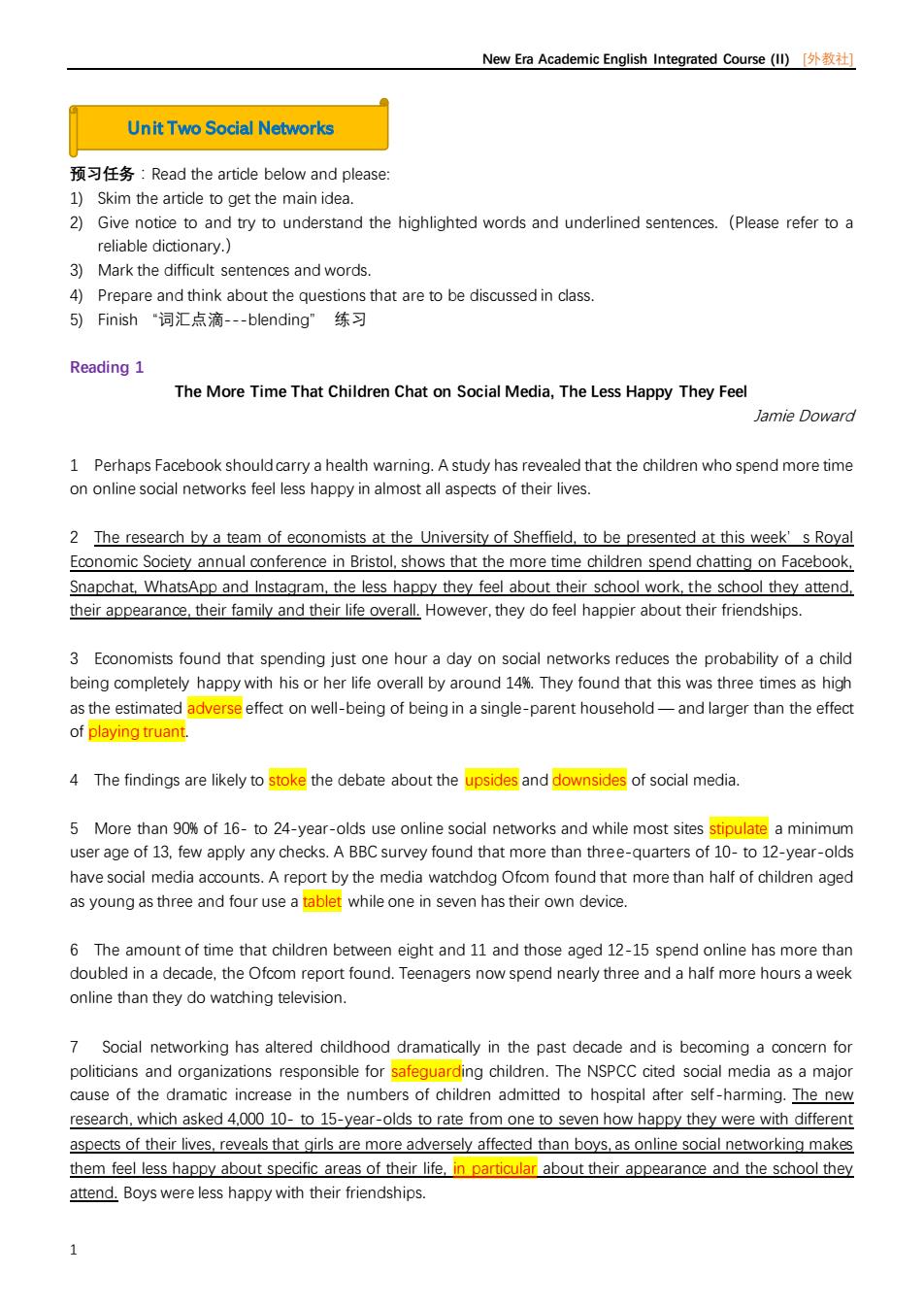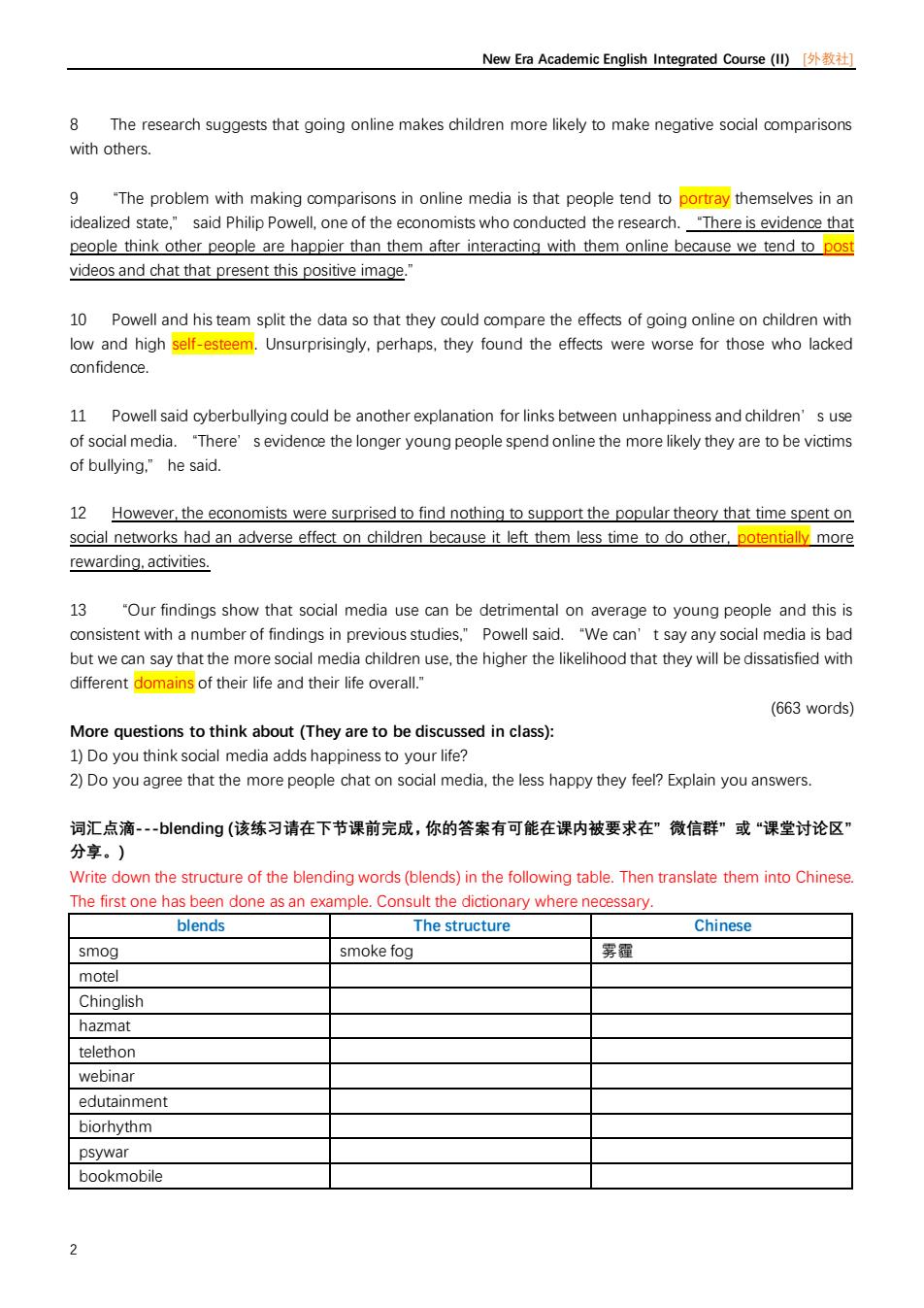
New Era Academic English Integrated Course())[外教 Unit Two Social Networks 预习任务:Read the artide below and please 1)Skim the artide to get the main idea. 2)Give notioe to and try to understand the highlighted words and underlined sentences.(Please refer to a reliable dictionary.) 3)Mark the difficult sentences and words. 4)Prepare and think about the questions that are to be discussed in dass 5)Finish“词汇点滴---blending练习 Reading 1 The More Time That Children Chat on Social Media,The Less Happy They Feel Jamie Doward 1 Perhaps Facebook should carry a health warning.A study has revealed that the children who spend more time on online social networks feel less happy in almost all aspects of their lives. 2 The research by a team of economists at the University of Sheffield,to be presented at this week's Royal Economic Society annual conference in Bristol,shows that the more time children spend chattingnFacebook Snapchat,WhatsApp and Instagram,the less happy they feel about their school work,the school they attend. their appearanoe,their family and their life overall.However.they do feel happier about their friendships. 3 Economists found that spending iust one hour a day on social networks reduces the probability of a child being completely happy with hisor he 所e overall by around They found s as the estimated adverse effect on wel -being of being in a single-parent household-and larger than the effect of playing truant 4 The findings are likely to stoke the debate about the upsides and downsides of social media. 5More than16-t24-year-ods use online social networks and while most sites stipulate a minimum user age of 13.few apply any checks.A BBC survey found that more than three-quarters of 10-to 12-year-olds have social media accounts.A report by the media watchdog Ofcom found that more than half of children aged as young as three and four use a tablet while one in seven has their own device. 6The amountof time that children between eight and 11 and those aged 12-15 spend online has more thar ioublednadecade.theOicomreportfound.TenagersnoWspendneaNythreandahafmorehoursawek online than they do watching television. 7 Social networking has altered childhood dramatically in the past decade and is becoming a cone for r9an☑ ons resp NSPCC cite of children admitted to hospital after self research.which asked 4.000 10-to 15-year-olds to rate from one to seven how happy they were with different aspects of their lives,reveals that girls are more adversely affected than boys,as online social networking makes them feel less happy about specific areas of their life,in particular about their appearance and the school they attend Boys were less happy with their friendships
New Era Academic English Integrated Course (II) [外教社] 1 预习任务:Read the article below and please: 1) Skim the article to get the main idea. 2) Give notice to and try to understand the highlighted words and underlined sentences.(Please refer to a reliable dictionary.) 3) Mark the difficult sentences and words. 4) Prepare and think about the questions that are to be discussed in class. 5) Finish “词汇点滴---blending” 练习 Reading 1 The More Time That Children Chat on Social Media, The Less Happy They Feel Jamie Doward 1 Perhaps Facebook should carry a health warning. A study has revealed that the children who spend more time on online social networks feel less happy in almost all aspects of their lives. 2 The research by a team of economists at the University of Sheffield, to be presented at this week’s Royal Economic Society annual conference in Bristol, shows that the more time children spend chatting on Facebook, Snapchat, WhatsApp and Instagram, the less happy they feel about their school work, the school they attend, their appearance, their family and their life overall. However, they do feel happier about their friendships. 3 Economists found that spending just one hour a day on social networks reduces the probability of a child being completely happy with his or her life overall by around 14%. They found that this was three times as high as the estimated adverse effect on well-being of being in a single-parent household — and larger than the effect of playing truant. 4 The findings are likely to stoke the debate about the upsides and downsides of social media. 5 More than 90% of 16- to 24-year-olds use online social networks and while most sites stipulate a minimum user age of 13, few apply any checks. A BBC survey found that more than three-quarters of 10- to 12-year-olds have social media accounts. A report by the media watchdog Ofcom found that more than half of children aged as young as three and four use a tablet while one in seven has their own device. 6 The amount of time that children between eight and 11 and those aged 12-15 spend online has more than doubled in a decade, the Ofcom report found. Teenagers now spend nearly three and a half more hours a week online than they do watching television. 7 Social networking has altered childhood dramatically in the past decade and is becoming a concern for politicians and organizations responsible for safeguarding children. The NSPCC cited social media as a major cause of the dramatic increase in the numbers of children admitted to hospital after self-harming. The new research, which asked 4,000 10- to 15-year-olds to rate from one to seven how happy they were with different aspects of their lives, reveals that girls are more adversely affected than boys, as online social networking makes them feel less happy about specific areas of their life, in particular about their appearance and the school they attend. Boys were less happy with their friendships. Unit Two Social Networks

New Era Academic English Integrated Course(D)[外 8 The research suggests that going onine makes children more likely to make negative social comparisons with others. 9 "The problem with making comparisons in online media is that people tend to portray themselves in an idealized state."said Philip Powell,one of the economists who conducted the research."There is evidence that people think other people are happier than them after interacting with them online because we tend to post videos and chat that present this positive image. 10 Powell and his team split the data so that they could compare the effects of goingninechildren with low and high self-esteem.Unsurprisingly,perhaps.they found the effects were worse for those who lacked confidence. 11 Powell said yberbullying coud be another explanation for links between unhappiness and childrensus of social media."There's evidence the longer young people spend online the more likely they are to be victims of bullying."he said 12 However,the economists were surprised to find nothing to support the popular theory that time spent on socal networks had an adverse effect on children because it left them less time to do other rewarding.activities. 13 "Our findings show that social media use can be detrimental on average to young people and this is consistent with a number of findings in previous studies."Powell said."We can't say any social media is bad (663 words) More questions to think about(They are to be discussed in class): 1)Do you think social media adds happiness to your life? 2)Do you agree that the more people chat on social media,the less happy they feel?Explain you answers. 词汇点滴--blending(该练习请在下节课前完成,你的答案有可能在课内被要求在”微信群”或“课堂讨论区 分享。) Write down the structure of the blending words(blends)in the following table.Then translate them into Chinese. The first one has been done as an example.Consult the dictionary where necessary. blends The structure Chinese smog smoke fog 雾霜 motel Chinalish haz telethon webinar edutainment biorhythm psywar bookmobile 2
New Era Academic English Integrated Course (II) [外教社] 2 8 The research suggests that going online makes children more likely to make negative social comparisons with others. 9 “The problem with making comparisons in online media is that people tend to portray themselves in an idealized state,” said Philip Powell, one of the economists who conducted the research. “There is evidence that people think other people are happier than them after interacting with them online because we tend to post videos and chat that present this positive image.” 10 Powell and his team split the data so that they could compare the effects of going online on children with low and high self-esteem. Unsurprisingly, perhaps, they found the effects were worse for those who lacked confidence. 11 Powell said cyberbullying could be another explanation for links between unhappiness and children’s use of social media. “There’s evidence the longer young people spend online the more likely they are to be victims of bullying,” he said. 12 However, the economists were surprised to find nothing to support the popular theory that time spent on social networks had an adverse effect on children because it left them less time to do other, potentially more rewarding, activities. 13 “Our findings show that social media use can be detrimental on average to young people and this is consistent with a number of findings in previous studies,” Powell said. “We can’t say any social media is bad but we can say that the more social media children use, the higher the likelihood that they will be dissatisfied with different domains of their life and their life overall.” (663 words) More questions to think about (They are to be discussed in class): 1) Do you think social media adds happiness to your life? 2) Do you agree that the more people chat on social media, the less happy they feel? Explain you answers. 词汇点滴---blending (该练习请在下节课前完成,你的答案有可能在课内被要求在”微信群”或“课堂讨论区” 分享。) Write down the structure of the blending words (blends) in the following table. Then translate them into Chinese. The first one has been done as an example. Consult the dictionary where necessary. blends The structure Chinese smog smoke fog 雾霾 motel Chinglish hazmat telethon webinar edutainment biorhythm psywar bookmobile